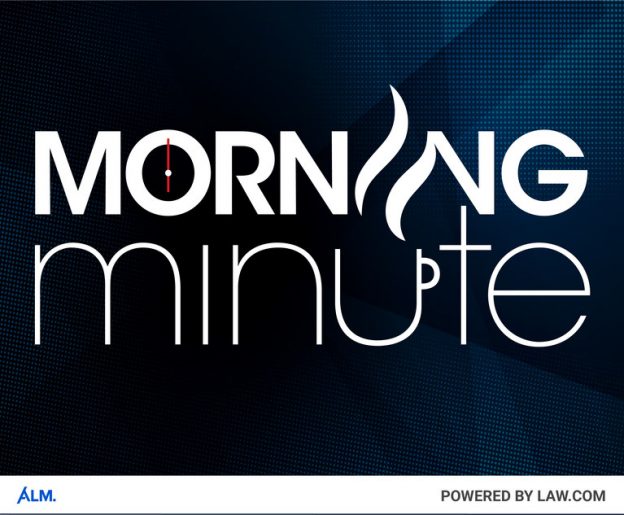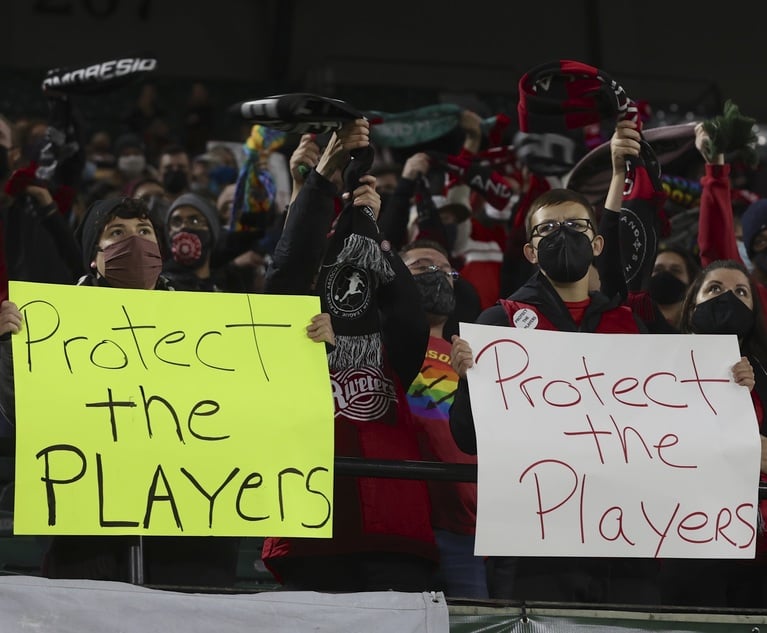As Camp Lejeune Suits Spike, Questions Arise About Lack of Fee Cap: The Morning Minute
The news and analysis you need to start your day.
March 14, 2023 at 06:00 AM
4 minute read

Want to get this daily news briefing by email? Here's the sign-up.
WHAT WE'RE WATCHING
NO CAP - Amid a spike of over 1,000% in litigation—detected by ALM's Law.com Radar—under the Camp Lejeune Justice Act of 2022, those in the industry—and Congress—are wondering if the law's lack of an attorney fee cap is best for clients. The act, signed into law in mid-2022, paved the way for those injured by toxic chemicals in the North Carolina Marine Corps base's water supply from the 1950s through the 1980s to file claims. The Congressional Budget Office estimated about $6 billion in payouts to those affected, but with the number of cases filed, over 150 in just the last month according to Law.com Radar, those damages could skyrocket and with it money for firms willing to take the cases. Traditional lawsuits against the government, under the Federal Tort Claims Act, have fees capped between 20% and 25%. But, as Law.com's Brad Kutner reports, no language under the CLJA limits fees and some lawyers and lawmakers are wary that plaintiffs lawyers may seek to take advantage of litigation one attorney called "iron clad" for plaintiffs.
APOCALYPSE NOW? - The demise of startup financing cornerstone Silicon Valley Bank on Friday sent tech corporate executives and legal department chiefs scrambling to find other sources of financing and immediate solutions. In the days and weeks ahead, observers told Law.com's Maria Dinzeo, corporate leaders and in-house legal teams will be racing to identify financial and payroll risks. Some affected companies may want to extend payment terms with vendors, review insurance options as well as lean on outside counsel, they said, with GCs immediately taking on a mountain of new responsibilities to help their companies regain footing in a shaky financial ecosystem. Companies that had the bulk of their funds deposited with SVB were in a particularly tight spot as the FDIC only insures up to $250,000 in deposits, offering a receivership certificate for the rest. "This is an apocalyptic moment for companies," said Foster Sayers, GC for software company Pramata on Friday. He said Pramata was able to pull money out of the bank and transfer it to another institution where it had an account just in time. The wire cleared Thursday afternoon. "It was not a moment too soon," he said.
ON THE RADAR - The Minnesota Pollution Control Agency and Governor Tim Walz were sued Monday in Minnesota District Court over the state's 'Clean Car' rules, which impose limitations on vehicles' C02 emissions and are set to take effect in 2024. The suit, brought by Winthrop & Weinstine, Boyden Gray & Associates and Sidley Austin on behalf of the Clean Fuels Development Coalition, Minnesota Soybean Growers Association and other plaintiffs, contends that the regulations are preempted by the Energy Policy and Conservation Act. The case is 0:23-cv-00610, Clean Fuels Development Coalition et al. v. Kessler et al. Stay up on the latest deals and litigation with the new Law.com Radar.
EDITOR'S PICKS
|
This content has been archived. It is available through our partners, LexisNexis® and Bloomberg Law.
To view this content, please continue to their sites.
Not a Lexis Subscriber?
Subscribe Now
Not a Bloomberg Law Subscriber?
Subscribe Now
NOT FOR REPRINT
© 2025 ALM Global, LLC, All Rights Reserved. Request academic re-use from www.copyright.com. All other uses, submit a request to [email protected]. For more information visit Asset & Logo Licensing.
You Might Like
View All
National Women's Soccer League Reaches $5M Deal to End Sex Abuse Case
3 minute read
Frito Lays Could Face Liability for Customer's Grocery Store Fall Over Pallet Guard, Judge Rules
4 minute read

NJ Jury Awards $8M to Woman Injured by Employees Chasing Suspected Shoplifter
3 minute readLaw Firms Mentioned
Trending Stories
- 1January Petitions Press High Court on Guns, Birth Certificate Sex Classifications
- 2'A Waste of Your Time': Practice Tips From Judges in the Oakland Federal Courthouse
- 3Judge Extends Tom Girardi's Time in Prison Medical Facility to Feb. 20
- 4Supreme Court Denies Trump's Request to Pause Pending Environmental Cases
- 5‘Blitzkrieg of Lawlessness’: Environmental Lawyers Decry EPA Spending Freeze
Who Got The Work
J. Brugh Lower of Gibbons has entered an appearance for industrial equipment supplier Devco Corporation in a pending trademark infringement lawsuit. The suit, accusing the defendant of selling knock-off Graco products, was filed Dec. 18 in New Jersey District Court by Rivkin Radler on behalf of Graco Inc. and Graco Minnesota. The case, assigned to U.S. District Judge Zahid N. Quraishi, is 3:24-cv-11294, Graco Inc. et al v. Devco Corporation.
Who Got The Work
Rebecca Maller-Stein and Kent A. Yalowitz of Arnold & Porter Kaye Scholer have entered their appearances for Hanaco Venture Capital and its executives, Lior Prosor and David Frankel, in a pending securities lawsuit. The action, filed on Dec. 24 in New York Southern District Court by Zell, Aron & Co. on behalf of Goldeneye Advisors, accuses the defendants of negligently and fraudulently managing the plaintiff's $1 million investment. The case, assigned to U.S. District Judge Vernon S. Broderick, is 1:24-cv-09918, Goldeneye Advisors, LLC v. Hanaco Venture Capital, Ltd. et al.
Who Got The Work
Attorneys from A&O Shearman has stepped in as defense counsel for Toronto-Dominion Bank and other defendants in a pending securities class action. The suit, filed Dec. 11 in New York Southern District Court by Bleichmar Fonti & Auld, accuses the defendants of concealing the bank's 'pervasive' deficiencies in regards to its compliance with the Bank Secrecy Act and the quality of its anti-money laundering controls. The case, assigned to U.S. District Judge Arun Subramanian, is 1:24-cv-09445, Gonzalez v. The Toronto-Dominion Bank et al.
Who Got The Work
Crown Castle International, a Pennsylvania company providing shared communications infrastructure, has turned to Luke D. Wolf of Gordon Rees Scully Mansukhani to fend off a pending breach-of-contract lawsuit. The court action, filed Nov. 25 in Michigan Eastern District Court by Hooper Hathaway PC on behalf of The Town Residences LLC, accuses Crown Castle of failing to transfer approximately $30,000 in utility payments from T-Mobile in breach of a roof-top lease and assignment agreement. The case, assigned to U.S. District Judge Susan K. Declercq, is 2:24-cv-13131, The Town Residences LLC v. T-Mobile US, Inc. et al.
Who Got The Work
Wilfred P. Coronato and Daniel M. Schwartz of McCarter & English have stepped in as defense counsel to Electrolux Home Products Inc. in a pending product liability lawsuit. The court action, filed Nov. 26 in New York Eastern District Court by Poulos Lopiccolo PC and Nagel Rice LLP on behalf of David Stern, alleges that the defendant's refrigerators’ drawers and shelving repeatedly break and fall apart within months after purchase. The case, assigned to U.S. District Judge Joan M. Azrack, is 2:24-cv-08204, Stern v. Electrolux Home Products, Inc.
Featured Firms
Law Offices of Gary Martin Hays & Associates, P.C.
(470) 294-1674
Law Offices of Mark E. Salomone
(857) 444-6468
Smith & Hassler
(713) 739-1250









